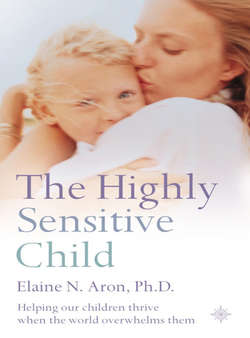Читать книгу The Highly Sensitive Child: Helping our children thrive when the world overwhelms them - Elaine N. Aron, Elaine N. Aron Ph.D. - Страница 34
WITH AN HSC, YOU MAKE A BIGGER DIFFERENCE
ОглавлениеEvery now and then someone is on the talk-show circuits arguing that genetics determine everything and parenting does not matter. Yes, at one time there was probably too much emphasis on the role of parenting, especially mothering, in shaping a child’s personality. No one even considered the role of inherited temperament. So a balance was certainly needed.
Ironically enough, however, the research is now clear that parenting does matter, and much more, in raising children like HSCs, whose temperaments are at the extreme end of normal. And in studies done with monkeys, “reactive” (sensitive) monkeys randomly assigned at birth to be raised by especially calm mothers (studies we cannot do with humans) turned out to be far more resilient adults, even troop leaders, compared to those raised by nervous mothers. Reactive monkeys who were randomly assigned to be subjected to separations from their mothers, on the other hand, were far more affected in adulthood by this trauma than less reactive monkeys.
Most HSCs do not have to deal with being totally separated from their caregiver, but research finds that they are more likely to be affected by caregivers who are mentally absent—due to stress or depression, perhaps—or who would just as soon not be there, or who may be overly afraid themselves about losing a close other. For example, Megan Gunnar and her colleagues at the University of Minnesota found that highly sensitive nine-month-olds left for a half hour with an attentive baby-sitter “playmate” were far less distressed physiologically during this separation from their mothers than they were when they were left with an inattentive caregiver. An attentive caregiver was almost as good as having mom present, but an inattentive one made the separation more stressful for HSCs than non-HSCs.
In another study, focusing on the general security or insecurity of the bond with the mother, these same researchers found that highly sensitive eighteen-month-olds who were generally insecure with their mothers (I will discuss this more in Chapter 6) had distressed bodily reactions in new situations, while secure HSCs were not affected. Non-HSCs were also not distressed by new situations, of course—whether their relationship with their mother was secure or not. That is, only the insecure HSCs’ were deeply distressed in new situations. Several more studies have found the same general results.
The conclusion? “A history of responsive, sensitive caregiving … provided the securely attached infant with the resources to reduce activation of the [bodily distress] system, even though the child’s temperament might bias him or her to experience novel events as ‘potentially’ threatening.” In other words, when sensitive toddlers are in the stressful situation of being separated from their mothers, they are all right if left with a caring person and not all right if left with an inattentive person. If they are in an unfamiliar situation that is particularly stressful for them, they are more affected by an insecure attachment to their mothers. They are very affected by the sense they will receive help if they need it. Not only do HSCs need to perceive support in such situations because they are more aware of the dangers, but they are also probably more aware of the degree of support and caring of their mothers and other caregivers.
